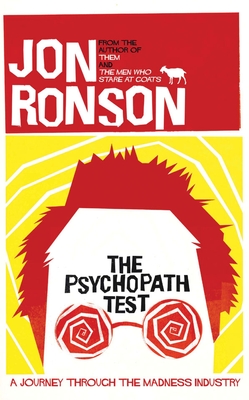 The Psychopath Test by Jon Ronson (Picador)
The Psychopath Test by Jon Ronson (Picador)
It is almost certain that, at some point, you have found yourself in a particular situation because someone – quite plausibly someone you’ll never meet – is insane. To an alarming extent, as will be confirmed by any reflection on your own life or an evening’s viewing of the news, our existences are governed by the caprices of the deranged.
An epiphany of this sort occurs to Ronson early in The Psychopath Test. He has just returned from Sweden. He has been to Sweden because he has been emailed by an academic who has received something weird in the post – and who has since discovered that other academics have been sent the same weird thing, a handmade book called Being Or Nothingness. Ronson has disinterred some clues, and followed them to Gothenburg, where he has tracked down the likely perpetrator, one Petter Nordlund. Back in London, he is informing the bewildered boffin of his conclusions. The book, it turns out, is neither sinister conspiracy nor devious prank. It is, rather, the unfathomable whim of a lunatic, if a mercifully affable and harmless one.
“It’s incredibly interesting,” says Ronson, to the reader as much as the disappointed scientist. “Aren’t you struck by how much action occurred simply because something went wrong with one man’s brain? It’s as if the rational world, your world, was a still pond, and Petter’s brain was a jagged rock thrown into it, creating odd ripples everywhere.”
Ronson spends the rest of The Psychopath Test pondering the degree to which human society is a response to insanity – specifically, the insanity of the relentless, dauntless, ego-driven, conscience-free, self-actualising and impenetrably confident creatures known as psychopaths. Ronson sets out one side of his fascination with such beings explicitly – a concern that they seem exactly like the type of person most likely to excel in politics and business, and therefore to end up dictating terms to the rest of us. He allows another angle to permeate the book subtly – a recognition, acknowledged with frequent but never quite overplayed reference to his own hobbling neuroses, that these ironclad overachievers, towing a baffled and terrified world in their wake, are everything he is not.
Ronson is on reasonably familiar ground here. His previous books have also been attempts to bring a patient, wry sanity to bear upon the apparently howling-at-the-moon barmy. In Them, he spent more time than most people could manage without committing violence in the company of conspiracy theorists. In The Men Who Stare At Goats, he met military researchers experimenting with a paranormal dimension to warfare. In The Psychopath Test, he displays the same facility for unearthing the illustrative and intriguingly ambiguous character, including an inmate of Broadmoor who claims to have calmly talked his way in, a Scientologist crusader against psychiatry, various refugees from the wilder shores of mental health studies, profoundly eccentric former spook David Shayler, and Bob Hare – the Canadian psychologist whose checklist of symptoms has become the standard diagnostic tool for psychopathy.
Beneath the weird characters and gentle humour, Ronson frets over a peculiar modern dilemma – whether it’s sensible to treat all deviations from some box-ticking conception of normality as illnesses. In the United States in particular, millions of children are routinely (and expensively) medicated for symptoms which would, just a generation ago, have been recognised as boredom or boisterousness.
This is a funny book with a serious point – that while we can classify, tranquilise and incarcerate the crazy, we remain forever at their mercy.

